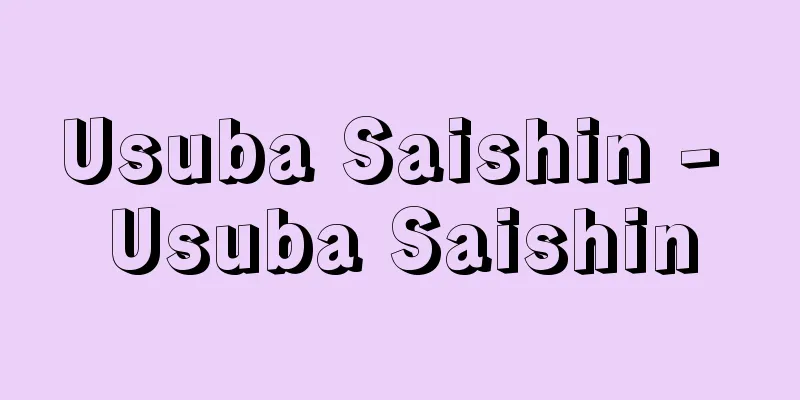Usuba Saishin - Usuba Saishin

|
A perennial plant of the Aristolochiaceae family (APG classification: Aristolochiaceae). Also called saishin. The rhizome lies on the ground, and at the end of the low, upright stem, two leaves with long stalks grow in pairs. The leaves are ovate, pointed at the tip, and heart-shaped at the base. The leaves wither in winter. From March to May, it produces an oblate-spherical flower with a stalk between the two leaves. Inside the calyx tube, there are 12 stamens and 6 pistils. It grows in the shade of trees in the mountains of Honshu and northern Kyushu. The closely related A. heterotropoides Fr.Schm. has large leaves with blunt tips, and is distributed from northern Honshu to Hokkaido. A. dimidiatum F.Maek., which has 6 stamens and 3 pistils, is also distributed in Shikoku and Kyushu. [Kei Sugawara, July 20, 2018] MedicinalIn traditional Chinese medicine, the underground parts are called as saishin and are used as an analgesic, cough suppressant, expectorant and diuretic. In folk culture, the leaves are chewed to get rid of bad breath. The roots have a spicy taste when chewed because they contain essential oils such as methyleugenol and cineole as well as other pungent ingredients. In China, A. mandshuricum (Maxim.) MYKim et SKSo ( A. heterotropoides Fr.Schm. var. mandshuricum Kitagawa), which is distributed in northeastern China and Korea, is used, while in Europe, A. europaeum L. is used. [Motoo Nagasawa July 20, 2018] Source: Shogakukan Encyclopedia Nipponica About Encyclopedia Nipponica Information | Legend |
|
ウマノスズクサ科(APG分類:ウマノスズクサ科)の多年草。サイシンともいう。根茎は地に伏し、低く立ち上がった茎の先端に長い柄をもった2枚の葉を対生状につける。葉は卵形で、先はとがり、基部は心臓形となる。冬は葉が枯れる。3~5月に、2枚の葉の間に柄のある扁球(へんきゅう)形の花をつける。萼筒(がくとう)の内部には12本の雄しべと6本の雌しべがみられる。本州および九州北部の山地の樹陰に生える。近縁のオクエゾサイシンA. heterotropoides Fr.Schm.は、葉は大きくて先が鈍く、本州北部から北海道に分布する。また、四国、九州には、雄しべ6本、雌しべ3本をもつクロフネサイシンA. dimidiatum F.Maek.が分布する。 [菅原 敬 2018年7月20日] 薬用漢方では地下部を細辛(さいしん)と称して鎮痛、鎮咳(ちんがい)、去痰(きょたん)、利尿剤として用いる。民間では葉をかんで口臭を除くのに用いる。根をかむと辛いのは、メチルオイゲノール、シネオールなどの精油と他の辛味成分を含有するからである。中国では中国東北部や朝鮮に分布するケイリンサイシンA. mandshuricum (Maxim.) M.Y.Kim et S.K.So(A. heterotropoides Fr.Schm. var. mandshuricum Kitagawa)を用い、ヨーロッパではオウシュウサイシンA. europaeum L.を用いる。 [長沢元夫 2018年7月20日] 出典 小学館 日本大百科全書(ニッポニカ)日本大百科全書(ニッポニカ)について 情報 | 凡例 |
>>: Thin-headed Caddisfly - Thin-headed Caddisfly
Recommend
Coprinus comatus
…[Rokuya Imaseki]. . … *Some of the terminology t...
Chemical fiber industry
The chemical fiber industry consists of the cellu...
Diffuse Reflection
Reflection from a diffusing surface such as a pow...
Micronutrients - Micronutrients
A general term for elements essential for plant gr...
White Wolf Uprising - White Wolf Broom
A popular uprising against Yuan Shikai in China fr...
Midway Airport
...It is located 37 km northwest of the city, and...
Daswanth
…The style of painting changed from flat and deco...
Ghost - Yūrei
[1] 〘Noun〙① The spirit of the dead. A ghost. ※Chuu...
book-seller (English spelling)
…Even before the printing era, there were booksto...
Kirgiz people - Kyrgyz people (English spelling)
The core population of Kyrgyzstan. Also called Hka...
Awaji Island
Awaji Island is the largest island in the Seto In...
Table of Circles
…In order to simplify the calculation of length a...
Hermeneutical cycle
…Foreign language sentences are a good example. I...
Beekeeping - beekeeping
It refers to the practice of raising honeybees to...
Ushikatabushi - Ushikatabushi
...A labor song from the Shimohei and Waga distri...








![Joseph [II] - Joseph](/upload/images/67cd1a8bdf9c0.webp)
